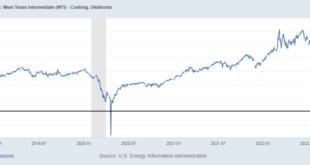Here in the West, particularly in countries such as the United States and Canada, we have experienced radical political and cultural changes over the past several years, and the pace of these changes seems to have accelerated since 2020. In the minds of many, there is an almost palpable feeling that a switch has been thrown and that the relationship between citizens and the state has been permanently altered. Perhaps the most salient revelation in the wake of these...
Read More »The Five Stages of Bank Failure Grief
We are familiar with the five stages of grief. However, it is not a stretch to apply those stages to what is happening to the banking system. Right now, we are in the second stage: anger. Original Article: "The Five Stages of Bank Failure Grief" [embedded content] Tags: Featured,newsletter
Read More »Crowding Out: The Fed May Be Killing the Private Sector to Save the Government
A "soft landing" is impossible unless the government cuts both taxes and government spending at the same time interest rates are rising. This won't happen, so get ready for a hard landing. Original Article: "Crowding Out: The Fed May Be Killing the Private Sector to Save the Government" [embedded content] Tags:...
Read More »Bank of England Economist: Britons Need to Accept That They’re Poorer
Although the Bank of England is largely responsible for inflation in the UK, its leaders blame British consumers and workers for the price increases. Original Article: "Bank of England Economist: Britons Need to Accept That They’re Poorer" [embedded content] Tags: Featured,newsletter
Read More »Energy Prices
While talk of high gas prices is no longer a headline issue, energy economics is still a vitally important aspect of understanding the economy, including the business cycle. Mark explains the basics, tells us where we now stand, and what the major implications are for the near future. Be sure to follow Minor Issues at Mises.org/MinorIssues. [embedded content]...
Read More »Coto Mixto: Anarchy in Galicia
A concrete example of an anarchic order existed within Spain, on the current border between Spain and Portugal, in the kingdoms of Castilla and Galicia. By “anarchy” I mean the abolition of centralized power, not the abolition of authority as leftists conceive it to be. One such regime was called Coto Mixto. It was a small territory located in the basin of the Salas River. Coto Mixto’s residents avoided the control of Spain and Portugal from approximately 1143 to...
Read More »The Whiskey Rebellion: A Model for Our Time?
The Free Market 12, no. 9 (September 1994) In recent years, Americans have been subjected to a concerted assault upon their national symbols, holidays, and anniversaries. Washington's Birthday has been forgotten, and Christopher Columbus has been denigrated as an evil Euro-White male, while new and obscure anniversary celebrations have been foisted upon us. New heroes have been manufactured to represent "oppressed groups" and paraded before us for our titillation....
Read More »Property Rights, Civilization, and Their Enemies
[This article is adapted from a lecture delivered at the Reno Mises Circle in Reno, Nevada. on May 20, 2023.] It is not an exaggeration to say that property rights are a prerequisite for civilization. As Ludwig von Mises wrote in The Free and Prosperous Commonwealth: Private property creates for the individual a sphere in which he is free of the state. It sets limits to the operation of the authoritarian will. It allows other forces to arise side by side with and in...
Read More »Summer Fellowship 2024
Fellowships in Residence at the Mises Institute in Auburn, Alabama, are available to graduate students and post-docs interested in scientific research in the Austrian school and libertarian political economy. These Fellowships offer a unique opportunity for full-time research and writing in a particular area of specialization under the guidance of Institute faculty. The program targets students seeking careers as academic educators and researchers, though students...
Read More »There’s No Place like Noam
Noam Chomsky's latest offering—a series of interviews—presents the best (and worst) of one of America's premier public intellectuals. Original Article: "There's No Place like Noam" [embedded content] Tags: Featured,newsletter
Read More » Swiss Economicblogs.org
Swiss Economicblogs.org




